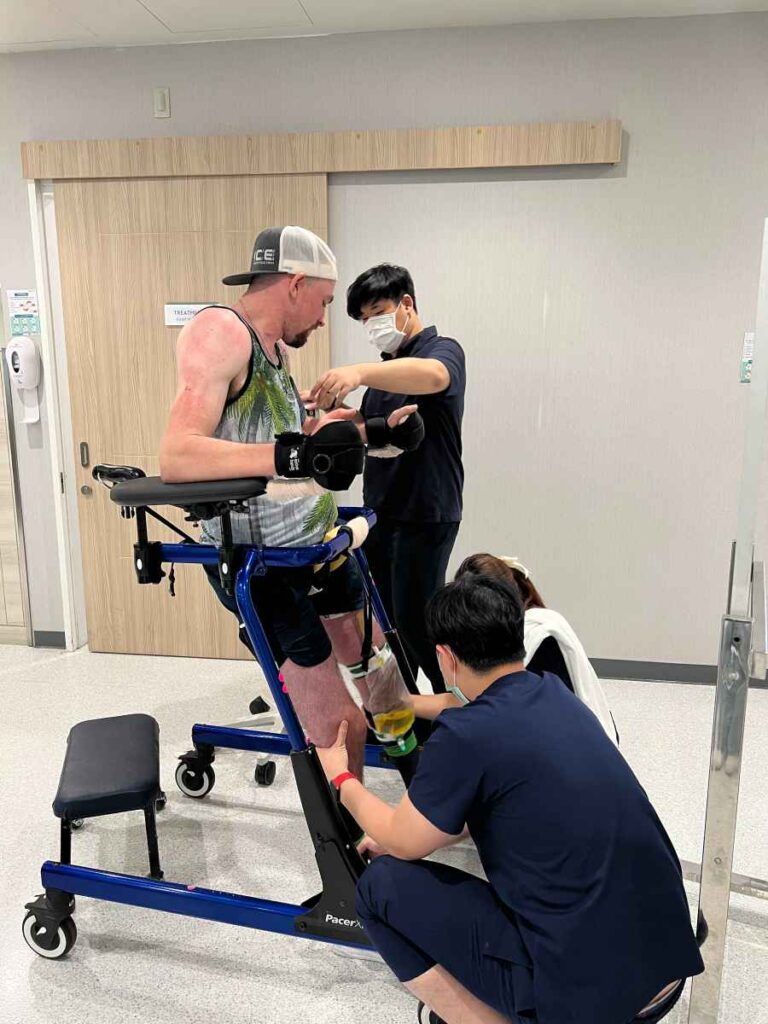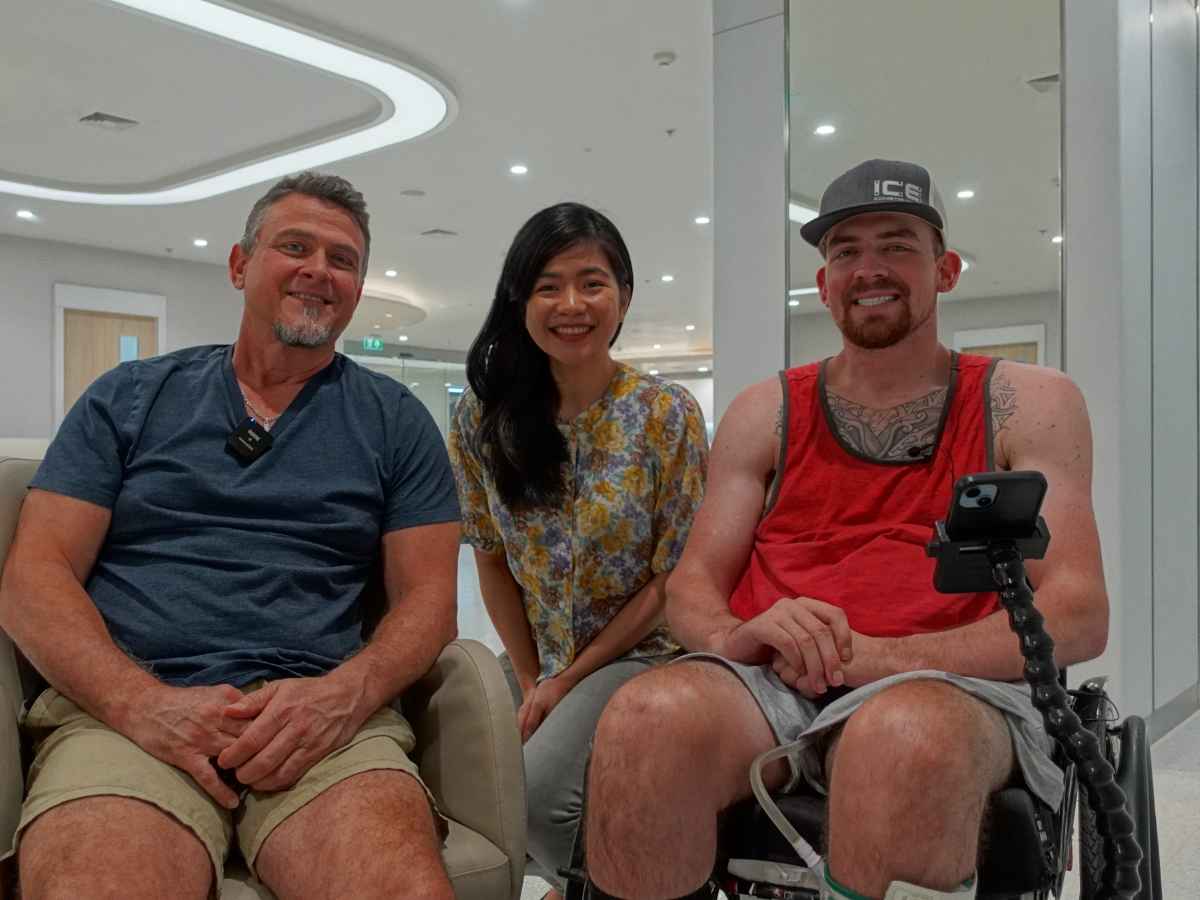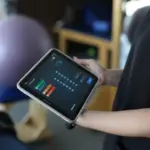Zachary is a C6 level spinal cord injury patient, receiving lumbar spinal stimulation after having a stimulator implanted at the T12 level. This is the part mainly responsible for locomotion and muscle function in lower limbs. As a result of this treatment, Zachary saw amazing results, which fundamentally have given him hope of regaining independence. He spoke with Verita Neuro’s Medical Director, Dr Nasir Majeed and Hanna Charles, Director of Patient Services about how epidural stimulation treatment changed his life.
Zachary, to start with, maybe you could tell us a little bit more about yourself?
I’m from Dallas, Texas and I received my injury in February 2021. I was diagnosed as C6 incomplete but I didn’t have any movement below my chest. I just found out about Verita Neuro by doing research online after I got my injury. Of course, everybody looks at the quickest ways to heal and what's out there. So I ran across Verita on Instagram, and then I sent an email to the address provided, asking for a consultation. I didn't know if I would get anything back or not, and then surprisingly, Miss Vea sent back a message within the same day, I think, or within a few days and that's what kind of got everything started from there. I had an epidural spinal cord stimulator implanted into my spine at the T12 level and the focus of my treatment was to improve my lower body function.
Before the treatment, I had very little arm movement, no triceps, just really my forearms and biceps. I also had very little ab control, I didn't have good sitting balance or just good arm moving. I mean, I can be in a manual chair, it's just a lot of work on my shoulders, just because I don't have much strength.
Before the treatment, I had very little arm movement, no triceps, just really my forearms and biceps. I also had very little ab control, I didn't have good sitting balance or just good arm moving. I mean, I can be in a manual chair, it's just a lot of work on my shoulders, just because I don't have much strength.
Could you help us understand the timeline of your stay and how quickly did you start to notice changes?
I think we arrived in Bangkok on a Saturday and I was prepped and having surgery that Sunday. As soon as we arrived Saturday morning, we went straight into getting imaging done, getting my bones tested to make sure they were strong enough to withstand weight for weight-bearing exercises, and a lot of different tests run before surgery, to make sure everything was right. I had to get another MRI and stuff like that. But it all came out good and I was confirmed as a good candidate to get it done. Monday, I had surgery, and I think I had one rest day, the rest of Monday and Tuesday. By Wednesday, I was seeing movements in my legs that I haven't seen in over two years. It was automatic, I was able to raise my ankles up and down, and started to learn how to pull my legs up within three days of having the surgery.
The stay was incredible, they are the nicest people there. It's so different from America, on the healthcare side, that was probably the nicest stay I've had since I was hurt, and I've been to a lot of hospitals. So that part of it was great. And then I just started seeing really fast progress in my lower extremities. I was on a couple of medicines for spasms and spasticity and stuff like that but I got off them and that's when I really started seeing changes in my legs and having a lot more control over knowing when I can pull my ankle up and lift my leg up. It was just wild to me, it was crazy. I didn't know it was going to work like that!
The stay was incredible, they are the nicest people there. It's so different from America, on the healthcare side, that was probably the nicest stay I've had since I was hurt, and I've been to a lot of hospitals. So that part of it was great. And then I just started seeing really fast progress in my lower extremities. I was on a couple of medicines for spasms and spasticity and stuff like that but I got off them and that's when I really started seeing changes in my legs and having a lot more control over knowing when I can pull my ankle up and lift my leg up. It was just wild to me, it was crazy. I didn't know it was going to work like that!
Could you tell us a bit about what a typical day looks like?
The recovery process was pretty easy. I was a little sore after surgery, but nothing too bad. I will say if you can feel anything from your injury level down, you're going to want to be ready because you can feel it at first. It takes a couple of days to get adjusted and get your body used to the device, but other than that, for me, it was great.
We would get up in the mornings, me and my dad, and I would either get a bed bath or shower, eat breakfast, and then we would go straight into physical therapy. From physical therapy, we would go to mapping, which felt just like physical therapy to me because you work just as hard. I would usually map for two hours, take lunch for an hour, and then go back and map for the last half of the day. I promise you by the time you're done, you're ready for a break! I thought I was in shape before I came over but I left in shape!
We would get up in the mornings, me and my dad, and I would either get a bed bath or shower, eat breakfast, and then we would go straight into physical therapy. From physical therapy, we would go to mapping, which felt just like physical therapy to me because you work just as hard. I would usually map for two hours, take lunch for an hour, and then go back and map for the last half of the day. I promise you by the time you're done, you're ready for a break! I thought I was in shape before I came over but I left in shape!
What does your physical therapy routine look like now you are home after your treatment? Are you back in the gym?
I have a consultation set up to get into inpatient rehab where I'd be getting rehab six days a week. Right now I work out every day, usually five days a week, at my house in my garage. We have a big workout setup and equipment and I just recently got an e-pacer and all this stuff. I need to use it so I'll have a way of getting up and still walking at home. I still do all the exercises that I was taught to do in Thailand. I usually work out anywhere from four to five hours a day, compared to before I went to Thailand, when I'd work out maybe one to two hours a day, including pushing my manual chair down the road just going on a walk and stuff like that. Now it's a lot more intense because I have hope again - I see my legs move, so I want to work them as hard as they'll let me work them.
I was telling everybody “I haven’t walked in 2 years, there's no way in 35 days they're gonna give me everything I need to walk” but I got everything I need to walk so now I just need to build it up stronger. That's what is pretty exciting to me - eventually, one day, if you push hard enough and keep at it every day, you're going to be able to walk because it's moving all the muscle groups that need to be moved.
I was telling everybody “I haven’t walked in 2 years, there's no way in 35 days they're gonna give me everything I need to walk” but I got everything I need to walk so now I just need to build it up stronger. That's what is pretty exciting to me - eventually, one day, if you push hard enough and keep at it every day, you're going to be able to walk because it's moving all the muscle groups that need to be moved.

Please could you maybe describe to us what functions you have regained since the treatment?
My workout routine is very different because I've never really worked on my lower half before. Now I have to work out my calves, my thighs, putting ankle weights on my feet, and pulling my foot all the way up to work my calves out. So everything is mainly focused a lot more on my lower body than my upper body because I still have good arm movement. I think a lot of it has to do with the physical therapy and everything, but my left tricep has gotten a lot stronger. My right has always been about 20 or 30% maybe, and now my left is actually starting to pick up a little bit and improve as I work out. I've noticed that difference just from when I got there, compared to now.
Did you have concerns about coming to Thailand? And what do you feel now?
Well, it wasn't really as sketchy to me as I guess everybody else may see it, just because I always traveled for work before I got hurt. So I just looked at it, kind of like traveling. But I realized it was a big deal when I would tell someone my plan, and they'd say “WHAT are you going to do!?” They would act like it's a big deal. After so many people do that, you think ‘Man, maybe this is kind of a big deal!’ and you sit back and look at the whole picture - I flew across to the other side of the world to get this procedure that I didn't know anything about.
I guess some people think that is sketchy. But I will say anybody else that's paralyzed that sees this will completely agree with me - anything is worth it to get any type of recovery. If there's people succeeding from it then, heck yeah, I'm all in! I watched a lot of the videos before I made up my mind and I talked to another patient. When we talked about it, I already kind of had my mind made up about coming anyway, just because I knew this would be the best shot at getting independence and getting as much function back as I possibly could.
Once we got there, it was not just in the facility, but outside the facility too, everybody was really polite, always giving, and always had a helping hand. So that was very nice - people are very generous and friendly over there, compared to back here in the States. The quality of the stay was amazing. There were nurses coming in every 30 minutes, at least, to make sure I was okay, to check on me, to bring me something. It wasn't like you had to call to ask for something, there was always somebody there. That's pretty relevant after you have surgery and when you're in the hospital laid up for a couple of days. So I liked that a lot but it was all great. It all worked out well. I mean, of course, there's a little bit of pain along the way but nothing you can't tolerate.
I guess some people think that is sketchy. But I will say anybody else that's paralyzed that sees this will completely agree with me - anything is worth it to get any type of recovery. If there's people succeeding from it then, heck yeah, I'm all in! I watched a lot of the videos before I made up my mind and I talked to another patient. When we talked about it, I already kind of had my mind made up about coming anyway, just because I knew this would be the best shot at getting independence and getting as much function back as I possibly could.
Once we got there, it was not just in the facility, but outside the facility too, everybody was really polite, always giving, and always had a helping hand. So that was very nice - people are very generous and friendly over there, compared to back here in the States. The quality of the stay was amazing. There were nurses coming in every 30 minutes, at least, to make sure I was okay, to check on me, to bring me something. It wasn't like you had to call to ask for something, there was always somebody there. That's pretty relevant after you have surgery and when you're in the hospital laid up for a couple of days. So I liked that a lot but it was all great. It all worked out well. I mean, of course, there's a little bit of pain along the way but nothing you can't tolerate.
We’re so glad - Your mappers and PT are missing you!
They were really, really helpful and it was a life-changing experience, for sure. A lot of good things happened out of it.
Do you have a message for other people who are considering epidural stimulation?
I would say, jump all over it - I would do it again in a heartbeat just because of everything I can do now, just motor function-wise. I know I’m eventually going to be strong enough to get up and I might be walking with braces, or however, but I have that feeling that there's hope there now. Because I see everything that's moving and working and it just takes time to build up muscles. You’ve just got to stick with it. I would for sure say, don't be scared - there's even a clinic in Guadalajara, Mexico that people in the States can travel to if they don't want to travel all the way to Bangkok. For me, the facility in Bangkok is where it's at, I will say that. Everybody there was more than nice and it was a great experience for me, being there. A life-changing experience and it's going to make my life a lot better. So I would tell them to do it!
The above is not a verbatim transcript of Zachary’s interview. Some comments have been slightly altered or re-arranged in order to improve the reading flow. If you would like to hear the full webinar, you can visit our YouTube channel here.





